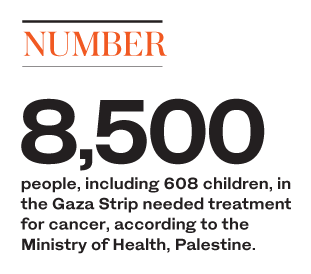GAZA CITY: A Palestinian woman has accused Israeli authorities of subjecting her family to “real suffering” over restrictions on escorting their 13-year-old son to hospital for cancer treatment.
Nisreen Al-Shawaf’s son, Saddam, developed leukemia several years ago and receives treatment in Palestinian hospitals in the West Bank or Jerusalem.
Israeli authorities have repeatedly refused to allow the boy’s father, Hussein, 67, to escort him on the 30 km journey from Abasan in the southern Gaza Strip. The refusals were made on “security grounds,” according to Al-Shawaf.
“The occupation manipulates us and the life of my child,” she said.
Treatment for Saddam’s illness has not been available in the Gaza Strip, which has been under virtual siege since the Hamas takeover in mid-2007. Now Al-Shawaf is looking to a new cancer-treatment center in Gaza to improve her son’s hopes of treatment.
 The Dr. Musa and Suhaila Nasir Department for Pediatric Cancer will open on Feb. 19. The center, the largest in the Palestinian Authority, is funded by the Palestine Children’s Relief Foundation, a US-based nongovernmental organization founded in 1991 that provides medical services to sick and wounded children in the Middle East.
The Dr. Musa and Suhaila Nasir Department for Pediatric Cancer will open on Feb. 19. The center, the largest in the Palestinian Authority, is funded by the Palestine Children’s Relief Foundation, a US-based nongovernmental organization founded in 1991 that provides medical services to sick and wounded children in the Middle East.
Ranan Al-Muthaffar, the foundation’s executive vice president for operations, told Arab News that all children with cancer in Gaza are referred for treatment abroad, but in most cases were unable to travel with their loved ones because of Israeli restrictions on permits.
The $3 million pediatric department will include two 16-room accommodation centers, a 15-bed daily care room, kitchen, pharmacy and library. It will also offer school instruction to help students continue their studies. Staff will consist of a director, four doctors and 17 nurses.
Dr. Zeina Salman, a volunteer doctor with the foundation, said that the department will provide chemotherapy treatment for about half of the cancer patients in Gaza, while those who need radiation therapy will have to travel to other hospitals.
In the meantime, the Palestinian Authority’s Ministry of Health is forced to refer cancer patients to Palestinian hospitals in the West Bank and Jerusalem, or to Israeli hospitals, where they must pay for treatment.
Al-Shawaf said the journey Saddam must undertake for treatment — from Gaza and through the Israeli-controlled Erez crossing — represents “real suffering.”
The trip begins with an application for an Israeli permit for the patient and his escort through the authority’s “treatment department.”
Saddam’s father, who is also suffering from cancer, accompanied his son on his first hospital visits.
“But we have been shocked by the authorities’ refusal to accept my husband as an escort for Saddam, and to set impossible conditions for granting a permit,” Al-Shawaf told Arab News.
She said her husband’s requests to escort his son had been denied four times.
Al-Shawaf said Israeli authorities had also forced her to reapply for a permit after she began accompanying Saddam.
The Israeli treatment of cancer patients, especially children, leaves families in a “whirlpool,” she said.
“They are burdened with daily anxiety about the treatment needed in Gaza and the permit
to leave the Erez crossing,” she said.
According to the ministry, 60 percent of patients’ requests for permits are rejected by Israeli authorities, and 5 percent of patients were detained in 2018.
More than 8,500 people, including 608 children, in the Gaza Strip needed treatment for cancer, the ministry said.
In a report issued on World Cancer Day on Feb. 4, the Al-Mezan Center for Human Rights said that the psychological and physical suffering of cancer patients in Gaza is compounded by a shortage of medical equipment and medicines.
The center claimed Israeli restrictions had resulted in the deaths of 45 cancer patients in the enclave from 2016 to 2018.


























